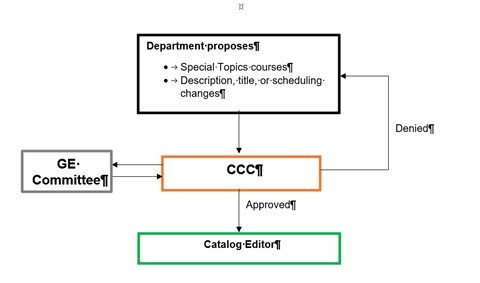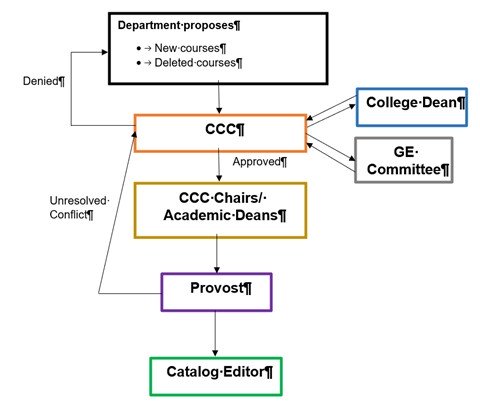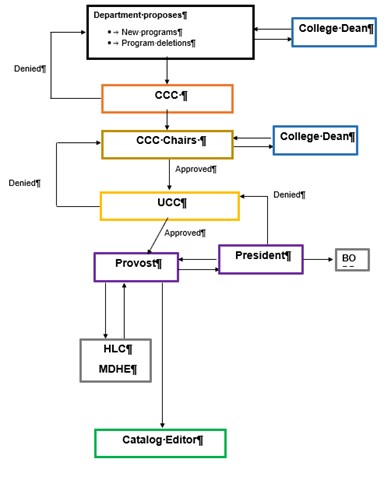Purpose
When curriculum changes are proposed, the following guidelines should be followed.
Scope
This policy applies to all faculty within the University.
Policy
All change proposals are evaluated first by a college curriculum committee. Depending on the complexity of the proposal, it may also receive additional review as detailed below.
- College Curriculum Committee (CCC): Each academic college maintains a committee with cross system representation to review course/program proposals from within the college. CCC membership includes a representative from each program, preferably comprising of an odd number of members. The members select a chair to oversee meetings, to communicate the committee’s progress to the school dean, and to be responsible for moving the proposals to the next step in the process. The CCCs
- (a) Collect proposals for course/program creation, deletion, or revision throughout the academic year.
- (b) Provide/gather the subject area expertise needed to review a given proposal.
- (c) Communicate the process for course/program proposals to colleagues within their college.
- (d) Review proposals for the creation/deletion of courses/programs within the college.
- (e) Facilitate internal reviews of newly created degree programs after 3-4 years, or as needed.
- CCC Chairs: To prevent duplication or potential conflict between programs offered in different colleges, new course proposals and proposals for course deletion are checked by the CCC chairs and by the academic college deans before they are submitted to the provost for inclusion in the university catalogs. The shared mission also includes ensuring that the common standards are used for the creation/deletion of courses across the university.
- University Curriculum Committee (UCC): Committee members are appointed by the Provost and Vice President for Academic Affairs. Faculty-at-Large members are elected by the college faculty. The Student members are appointed by the Student Government Association. Rotating members serve a three-year term with the exception of the student representatives, who serve a one-year term. The UCC is chaired by the Associate Provost for Academic Operations and Student Success, who serves in a nonvoting capacity, unless called upon to break a tie vote. Other faculty/staff members are sometimes called upon to provide additional information on a program proposal. The UCC meets monthly and is responsible for
- 1) becoming informed of the existing academic policies and curriculum;
- 2) reviewing and approving proposed curriculum and academic policy changes
- 3) reviewing and auditing the University’s quality assurance procedures as well as the results of those procedures and renders recommendations and solutions to the Provost for particular cases in which interpretation of academic policy is needed; and
- 4) serving as both a representative for their respective constituent group and as a conduit for communication from the Committee.
Categories of Curriculum Change Proposals
Minor Revisions:Minor revisions include creation of new special topics courses and changes to existing course descriptions, titles, and course offering schedules and minor changes to program requirements. The CCC may take one of the following actions on minor revisions:
- Vote in favor of the proposal.
- Table the proposal until additional information is provided.
- Send the proposal back to the corresponding department for revision.
- Reject the proposal.
If approved by the CCC, the proposal is sent to the catalog editor by the CCC chair.
Figure 1: Minor Revisions Process

Course Proposals:Course proposals include the creation/deletion of courses, and assignment of General Education designation to new or existing courses. The CCC may take one of the following actions on Course Proposals:
- Vote in favor of the proposal.
- Table the proposal until additional information is provided.
- Send the proposal back to the corresponding department for revision.
- Reject the proposal.
The CCC consults with the school dean before making a decision. Once a proposal is approved by the CCC, the chair posts it so that it can be checked by the other CCC chairs and the Deans for potential conflicts or duplications. Any such conflicts are referred to the provost for resolution. If a resolution is reached and approved, the proposal is sent to the catalog editor for inclusion to the next catalog. If no resolution is achieved, the proposal is returned to the corresponding CCC.
Figure 2: Course Proposal Process

Program Proposals: Program proposals include the creation and deletion of programs as well as significant revision to existing programs. The CCC may take one of the following actions on program proposals:
- Vote in favor of the proposal.
- Table the proposal until additional information is provided.
- Send the proposal back to the corresponding department for revision.
- Reject the proposal.
The CCC consults with the school dean before making a decision. Once a proposal is approved by the CCC, it is sent to UCC for consideration. UCC may take one of the following actions on program proposals:
- Vote in favor of the proposal.
- Table the proposal until additional information is provided.
- Send the proposal back to the corresponding CCC for revision.
- Reject the proposal.
In the event of a tie, the UCC Chair casts the deciding vote. If approved by UCC, the approved proposal is sent to the provost to review with the president for final approval. If approved, the president notifies the Board of Trustees. The provost notifies the Higher Learning Commission (HLC) and Missouri Department of Higher Education (MDHE) of the program creation or deletion. Once all required approvals are received, the provost submits the proposal to the catalog editor for inclusion in the university catalogs.
Figure 3: Program Proposal Process













